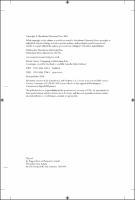Chapter 8 Quarantine sanitization, colonialism and the construction of the ‘contagious Arab’ in the Mediterranean, 1830s–1900
Author(s)
Chircop, John
Collection
EU collectionLanguage
EnglishAbstract
This chapter investigates the setting up of a network of lazarettos along the southern and eastern littorals of the Mediterranean during the nineteenth century. The fundamental thesis is that these lazarettos, constructed and frequently directed by Europeans, sustained the expansion of Western colonialism in the region. Starting with an investigation of the workings of the first Sanitary Councils – in North Africa and Ottoman-ruled ports – which preceded the International Sanitary Conferences, the study then goes on to show how maritime quarantine catered for the European powers’ commercial, shipping and imperial interests in the region. By examining the regulations and the actual practices of disinfection adopted in these lazarettos, this chapter also shows how these institutions constructed and/or consolidated stereotypes of the ‘Muslim Arab’ as a ‘threatening contagious body.’
Keywords
arab body; 19th century; european colonialism; muslim identity; sanitary councils; islamic mediterranean; arab body; 19th century; european colonialism; muslim identity; sanitary councils; islamic mediterranean; Arabs; Cholera; Hajj; Hejaz; Hygiene; Lazaretto; Mecca; Public health; QuarantineOCN
1030816307Publisher
Manchester University PressPublisher website
https://manchesteruniversitypress.co.uk/Publication date and place
2018Series
Social Histories of Medicine,Classification
European history
History and Archaeology
c 1500 onwards to present day
Social and cultural history
Society and Social Sciences
History of medicine


 Download
Download Web Shop
Web Shop